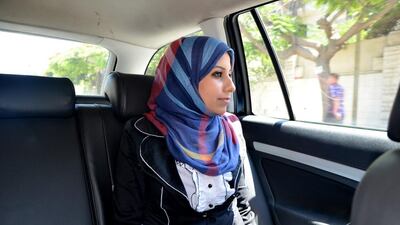Wearing a bright hijab, black blazer and long denim skirt, Mariam Abultewi sits in a taxi she had just ordered using Wasselni, a taxi-ordering and car pooling app she launched in Gaza four months ago.
Ms Abultewi, 25, is the first woman to have a start-up funded in Gaza, where more like her are beginning to start tech businesses they hope will generate incomes for their wider families in a cash-strapped society. Most of the women are young — some as young as Sofiya Mosalem, 16, whom Ms Abultewi was mentoring during the fourth and largest annual Gaza Startup Weekend last month.
Being a female entrepreneur in Gaza isn't easy, Ms Abultewi says. Initially her father wasn't happy about the plan, believing it wouldn't lead to a job or income. When she pitched her idea at Gaza's first start-up weekend in 2011, it was rejected.
“I only got one vote, and I voted for myself,” she says. “I wanted to leave the event.”
She returned in 2012 and won with the same idea that had been dismissed a year earlier. Ms Abultewi eventually secured seed funding from Palinno, a Palestinian mentorship programme. Since the launch of Wasselni, 1,000 users have created profiles, and 120 rides have been booked.
Even her father has come around to her way of thinking. He’s working on his own start-up idea incorporating his furniture-making skills and now encourages Ms Abultewi to involve her four sisters and three brothers in her work.
The day before Gaza Startup Weekend eight local and international mentors from Denmark, Dubai, Poland and the US arrived alongside a group of international investors to the office of Gaza Sky Geeks, a local start-up accelerator.
Tom Sperry, an investor and judge who runs Rogue Venture Partners, was among them. He says a major barrier for Gazan start-ups is that US investors are not legally allowed to invest in Gaza because of the government’s position that Hamas is a terrorist organisation.
“I believe that it should be done locally,” he says. “People should come here and help train and mentor the process, but all the knowledge transfer has to happen in Gaza. You have to have local investors solving local problems.”
Holding events like Gaza Startup Weekend can be unpredictable. Because of political tensions, a judge from Ramallah was refused entry to Gaza by Israel, and two judges and five mentors were forced to leave two days early.
And after Israel alleged that Hamas kidnapped three young Israeli settlers and launched air strikes on targets in Gaza, Mercy Corps, a partner in Gaza Startup Weekend, pulled its international guests out of the region.
Ms Abultewi lives next to the Nuseirat refugee camp, known to be a Hamas stronghold. Residents face severe rocket attacks and harsh living conditions throughout the year. But that does not dampen entrepreneurship.
Just two months ago Sofiya Mosalem had no idea what a start-up was; ahead of start-up weekend, however, she had a full website mock-up called Boom Baby Boom – a parenting advice portal aimed at Arab mothers and mothers-to-be living in the Middle East and North Africa.
Born in Ukraine to a Palestinian father and a Ukrainian mother – both doctors – Ms Mosalem and her family moved to Gaza when she was eight.
Her mentorship with Ms Abultewi is part of the Intalqi programme, funded by Google through Mercy Corps and Gaza Sky Geeks with the goal to increase the number of women in Gaza who successfully launch a start-up.
At this year’s start-up event 650 people applied to take part and on the day itself 70 ideas were pitched with just 25 chosen; of those 16 were led by women.
Ms Mosalem’s hopes of success were dashed when a family led by a 26-year-old woman, Hala Eid Naji, won. Their design app, Lilac, shows you how much furniture you can buy to furnish a room within a particular budget. A 14-year-old boy whose education app would deliver science tutorials took second place.
With the weekend over, Ms Mosalem returned late at night to climb the stairs to her family’s apartment in downtown Gaza. She used a torch app on her phone to light the way. The power was scheduled to go back on at 10:30pm _ but it was still pitch black.
She told her mother Olena that she won US$460 but didn’t come in first. The family were excited.
However, Ms Mosalem says her parents are sceptical about her business plan.
“My family says I can study whatever I want, but I think they are worried about me because I am a young teenager,” she says.
Her mother adds: “I hope for Sofiya that she will be happy and have an uncomplicated life.”
business@thenational.ae
Follow us on Twitter @Ind_Insights

